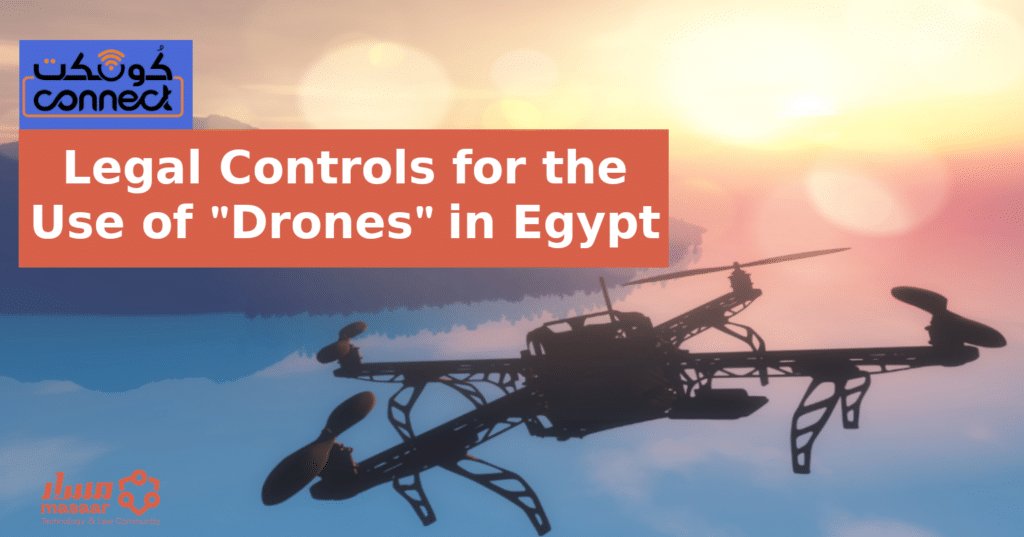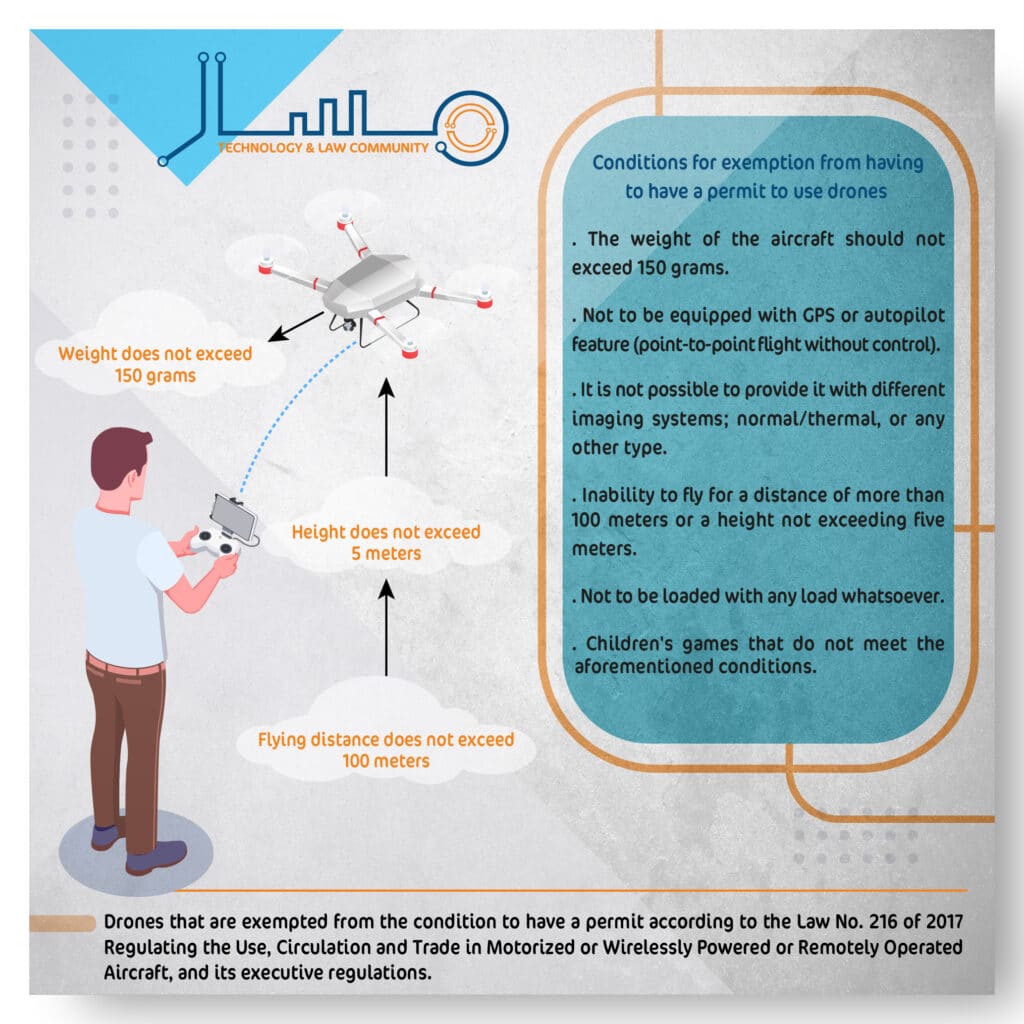Legal Controls for the Use of “Drones” in Egypt

During the recent few years, drones have had multiple uses, other than the military use, where advancements in technology have led to expanding its use for civil and commercial purposes by many companies. For example, Google has acquired Titan Aerospace which is specialized in the Drone Industry and used its products to provide Internet in remote areas. Facebook has done the same. There is also Amazon, which uses the same technology to deliver orders to its customers.
In addition to many other companies that use drones in various activities, such as the use of these drones to spray large areas of agricultural land with insecticides, monitor oil and gas pipelines, monitor any leaks, explosions or fires, or the tendency to employ “drones” to provide humanitarian aid in remote areas or for delivery of medicines and treatments needed by hospitals or needed in an emergency.
In light of the rapid development in the civilian uses of “drones”, the Egyptian legislator intervened in 2017, by issuing “Law Regulating the Use, Circulation and Trade in Motorized or Wirelessly Powered or Remotely Operated Aircraft.1”
Through that law, the legislator has tried to establish a regulatory framework for the operation of those aircraft that defined their legal and illegal uses, however, the law was largely influenced by concerns related to the non–civilian uses of these aircraft, which may be utilized in armed conflicts or terrorist crimes.
Through this article, “Masaar–Technology and Law Community” attempts to answer some questions related to the legal controls for using those aircraft in Egypt, and the effects of violating the limits drawn by the law.
The definition of “drones” and the procedures for permitting their use in the Egyptian law
The “Law Regulating the Use, Circulation and Trade in Motorized or Wirelessly Powered or Remotely Operated Aircraft” prohibits the import of, manufacture, assembling, trading, possessing, or using drones, except after obtaining a permit from the competent authority, which is limited to the Ministry of Defense as stated in the executive regulations, and after fulfilling other conditions specified by law.
This prohibition applies to all entities and persons, including government agencies,
public and private companies, and natural persons. The law has also referred the requirements related to obtaining the aforementioned permit to the executive regulations of the law, which was issued mid–20182.
The law – in its definition of “drones” – has not clarified the categorization of their types or the purposes of their use, but rather, the definition was broad to generally apply the provisions of the law on all types of objects that can fly without a pilot, using any of the techniques.
The definition has mentioned only two controls, related to the technical capabilities of the “drones”;
The First: Related to the capability of loading the “drones” with additional loads, whether they are devices, equipment, armament systems, munitions, or explosives,
or any other threats to the country’s national security.
The Second: Related to the capability of operating the “drones” or controlling them remotely, and the ban on its use has extended to all forms of circulation and use, where there is a ban on importing, manufacturing, assembling, trading, possessing, or trading “drones”, without distinction.
Permit conditions for those in charge of manufacturing or renting “drones”
The executive regulations of the law have stipulated general controls for obtaining a permit to use drones, for companies or entities involved in its manufacture or rental. According to those regulations, the authority responsible for issuing the permit has become the Ministry of Defense.
A set of conditions is required to obtain the permit, for example:
- The number of aircraft required to be authorized and their specifications.
- Explanation of how the drones were obtained, or purchased.
- Obligating the holder of a permit to register his/her aircraft, their specifications, how they have been obtained, and the date of their handling and use.
- The provisions of registration in the commercial records also apply to the holder of the permit, and a number of specialists determined by the competent authority shall undertake the review3.
The procedures related to submitting an application for a permit to use “drones” for those involved in manufacturing or renting activities can be summarized in a number of main steps:
- Apply for a permit to the Military Operations Authority, fulfilling the documents specified by a decision of the Minister of Defense, and the request should include the number of aircraft required to be authorized, their specifications, and how they are to be obtained.
- The application shall be decided on either by acceptance or rejection within thirty days from the date of its submission, and the completion of the time period without a response is considered a rejection.
- In case of approval, the permit shall be issued for a period not exceeding three years.
The executive regulations have also set some other controls related to the renewal of the permit and the transfer of ownership, as follows:
- For the permit to be renewed, an application should be presented three months before its expiry date.
- An application must be submitted to the Ministry of Defense for a transfer of ownership of drones, and the application shall be decided on within thirty days from the date of its submission together with all the required documents.
Permit for commercial, sports or research purposes
The executive regulations have referred to some conditions related to the use of “drones” for commercial, sports or research purposes.
Those conditions have focused on the nature of the entity requesting the permit, the persons who will engage in the activity or activities required to be authorized, and the authorities whose prior approval is required to obtain the permit:
- Submitting an application from the economic or commercial authority, company, scientific institution, or sports club.
- A statement of the purpose of use and its Spatio-temporal scope.
- A statement of the nature of the activity, and the members who practice it, with a copy of the national ID.
- Security approvals from the National Security Authority, the National Security Sector, and the Public Security Sector for the entities and individuals practicing the activity.
- The approval of the Ministry of Civil Aviation and the competent authorities in the country.
On the other hand, the regulations have set some additional conditions related to commercial and tax licenses and exceptions that have been granted for scientific and academic uses of “drones”, including, for example:
- The executive regulations of the law require the submission of the commercial registration and tax card to the commercial entities that request the permit, indicating the economic and commercial activities of the entity.
- The regulations require that scientific institutes and institutions submit an acknowledgment not to use “drones” except within the limits of the scientific purpose for which it is authorized.
- The executive regulations of the law exclude universities and government and private institutes from the conditions for obtaining security approvals, and the approval of the Ministry of Civil Aviation and the competent authorities in the country, in the event that within its academic departments an aviation department, and the use of “drones” was in the framework of scientific research and the spatial boundaries of the university or institute4.
Termination or cancellation of the permit to use “drones”
The Law Regulating the Use, Circulation and Trade in Motorized or Wirelessly Powered or Remotely Operated Aircraft, and its executive regulations have distinguished between the cases in which the permit to use “drones” is terminated from one side and the cases in which the permit is canceled on the other, regardless of the purposes of use or the entity to which the permit is issued.
The termination of the permit happens in the following cases:
- If the authorized person does not submit an application to renew the permit three months before its expiry.
- The permit ends with the waiver of the authorized person, and the regulations did not clarify what is meant by the word “waiver”, since it can mean assigning the permit to a third party after the approval of the competent authority, or assigning the permit to a third party without the approval of the competent authority, or expressing a desire not to continue the permit.
- The disappearance of the legal form in which the permit application was submitted.
- The death of the authorized person.
As for canceling the permit, which is a decision issued by the competent authority, the regulations have stipulated three reasons for canceling the permit.
- Violation of the permit conditions.
- Change in the activity or end of purpose.
- The existence of a threat to national security or jeopardy to the public interest.
The permit may also be canceled in the event that the competent authority had rejected its renewal, the authorized activity has ended, or in the event that the permit is revoked; the authorized person is obligated not to dispose of his/her aircraft and to inform the competent authority (Ministry of Defense), within no more than three days, of all the data of these aircraft, until their position is legalized or a decision is issued in this regard.
The law, in general, has granted the status of a judicial officer to members of the military judicial police in relation to the application of the provisions of this law, its executive regulations and the decisions issued in implementation of it. Members of the military judicial control have the power to inspect the accuracy of the entry in the records of the entity authorized to use the “drones”, and to follow up on the practice of the authorized activity.
The Law Regulating the Use, Circulation and Trade in Motorized or Wirelessly Powered or Remotely Operated Aircraft has provided a broad definition of “drones”, as we previously mentioned, however, the executive regulations have exempted some types of “drones” from the requirement to obtain a permit in the event that the following technical specifications are fulfilled:
- The weight of the aircraft should not exceed 150 grams.
- Not to be equipped with GPS or autopilot feature (point-to-point flight without control).
- It is not possible to provide it with different imaging systems; normal/thermal, or any other type.
- Inability to fly for a distance of more than 100 meters or a height not exceeding five meters.
- Not to be loaded with any load whatsoever.
- Children’s games that do not meet the aforementioned conditions.
It should be noted that the executive regulations have mentioned specific methods that must be followed in order to determine the fulfillment of specifications that exempt “drones” from the requirement to obtain a permit; where the regulation obliges the entity requesting the permit to submit an application to the Operations Authority of the Ministry of Defense, and a report from the Customs Authority shall be attached to the request regarding the availability of the specifications referred to in the regulation, and approval is issued after being examined by specialists from the Ministry of Defense within thirty days from the date of submitting the application.

